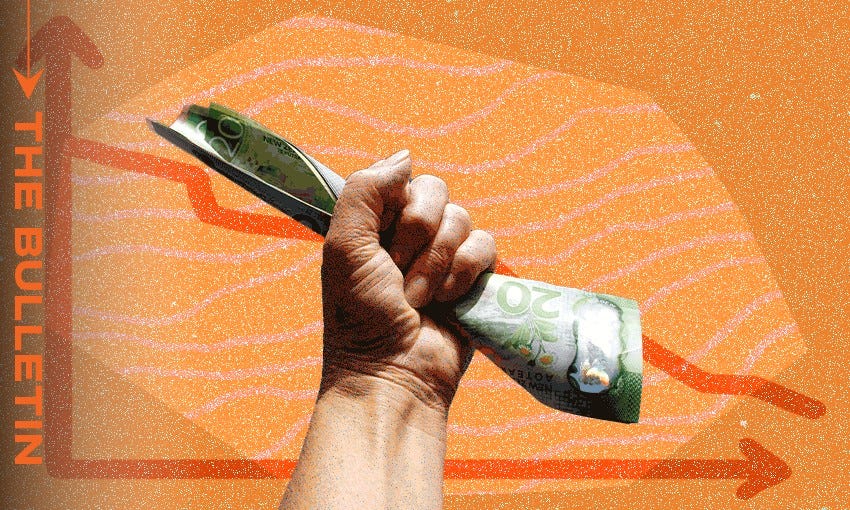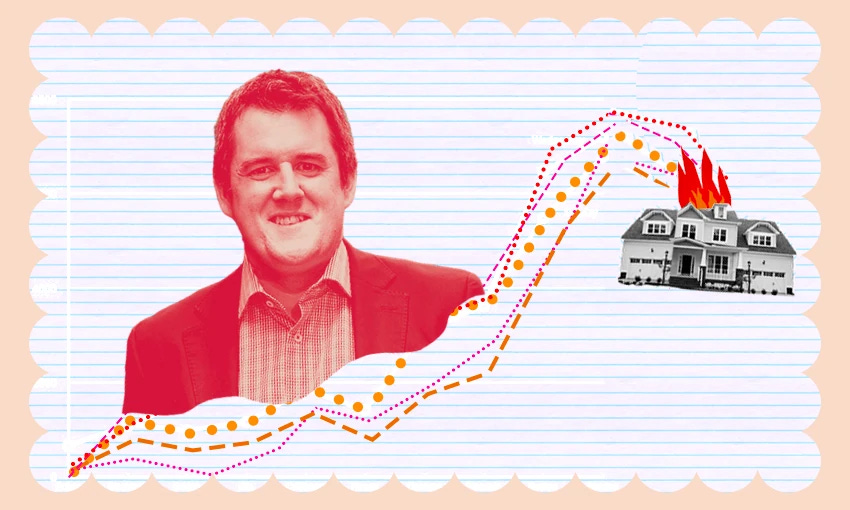The state of the economy, and the power of the 'R' word
Data this morning will reveal whether or not the country has pulled out of recession.
Mōrena, and welcome to The Bulletin for Thursday, June 20.
In today’s edition: A live blog from a wild day in politics in *checks notes* 1984, earthquake strengthening rules set for shake-up and the PM’s Japanese tour comes to a close. But first, the state of the economy will be laid bare this morning. Can we expect any good news?
Have we escaped recession, and will it even matter?
We’re about to find out if the country is still in an economic recession. At 10.45am, the latest round of Stats NZ data will make the state of the economy a little clearer, though it’s always worth remembering that the figures are instantly out of date given they reflect the period ending three months ago (the data released will cover the March quarter). If the state of the economy has blissfully passed you by, RNZ’s money correspondent Susan Edmunds explains the current downturn and how we ended up here, which makes for quite grim reading.
There’s a whole range of forecasts about what we’ll learn today, but the broad consensus is that there’s no consensus. According to The Post’s Tom Pullar-Strecker, economists are divided on whether or not New Zealand will have pulled out of the technical recession or not. A further retraction, even by a minuscule 0.1%, will mean we haven’t. It wouldn’t mean a lot in real terms, but it would trigger a wave of negative news headlines that does little to improve the general feeling of gloominess. Those predicting economic growth aren’t expecting that to mean much either. The Herald’s Liam Dann wrote that while some banks like ANZ and ASB are forecasting a slight pick-up in activity, a whisker-thin 0.1% or 0.2%, “no one is suggesting the economy is anything other than flat”. But is there any good news?
The road ahead
Today’s figures are just one stop on a longer journey for the economy. Interest’s David Hargreaves reported yesterday on a speech from the Reserve Bank’s chief executive Paul Conway titled “Inflation: the road back to 2%” which looked at our current “slow-to-no-to-negative growth environment”. There was a glimmer of optimism, reported Hargreaves, with Conway predicting continued declines in inflation. The central bank remains committed to its aim of getting inflation back within the 1-3% range by the end of the year. But there’s a long road ahead. Writing earlier in the week, Hargreaves noted that whether or not we’ve pulled out of recession won’t mean a huge amount given the overall flatness of the economy. But, he wrote, “there is a power in that 'R' word”. In short, it’s about morale. Recession or not, things feel bad. Duncan Greive communicated that “vibe” better than anyone could back in 2022 in a piece simply titled: “Everything feels bad all the time”.
Given it’s June, that means we are coming to the end of another quarter. While data for that won’t come out for another few months, RNZ’s Gyles Beckford reported that things aren’t looking good for this period either. "The first quarter was flat to negative, and the second quarter doesn't look like it's going to be any better, if not worse," said BNZ’s senior economist Doug Steel. The general expectation remains that we could be waiting until next year for the worm to turn, as Susan Edmunds wrote for Stuff in March.
Perhaps unsurprisingly, one person calling for more drastic action in the face of economic challenges is former Labour minister and Act leader Richard Prebble (a key figure in The Spinoff’s new political podcast, Juggernaut). Writing for the Herald this week, Prebble said a recession was the perfect opportunity for “sweeping deregulation”. It’s food for thought.
Nicola Willis faces a grilling
The person keeping perhaps the closest eye on those numbers later this morning will be the finance minister Nicola Willis, who spent much of yesterday in front of opposition MPs for a post-budget grilling. It’s probably been the most popcorn-worthy of the scrutiny week hearings (patsy questions included), as The Spinoff’s Joel MacManus writes in this colourful report.
While much of Willis’s time was taken up responding to questions over the government’s as-yet-unfulfilled promise to fund new cancer drugs, there were some interesting economic tidbits. Jonathan Mitchell at the NBR (paywalled) looked at that, reporting that Willis acknowledged the economy was in a tough spot, but believed her first budget delivered at the end of last month would help inflation to fall. She cited the government’s emphasis on regulation changes and cutting red tape as a way to encourage job creation in the private sector (while reiterating the intention to keep finding cost savings in the public sector). Another interesting detail picked up by the Herald’s Thomas Coughlan was around charities, with Willis signalling that some could soon pay tax. That was an idea some (The Spinoff’s Toby Manhire included) speculated would form part of National’s pre-election tax plan. It didn’t, but it would still be a bold play now.
Across the ditch
I touched on this yesterday, but it bears repeating: New Zealand isn’t alone in the situation we find ourselves in, even if the avalanche of commentary may sometimes suggest otherwise. In Australia, reported The Guardian this week, the economy has “stalled” while inflation remains stubbornly high. This piece from the Australia Institute compares the economic situations in Australia, the United States and Canada, showing that inflation is largely rising and falling in line. Of course, Australia has avoided recession, and the ABC’s Gareth Hutchens reported that the country’s Reserve Bank governor wasn’t expecting one. Nevertheless, the bank expects it will be “some years” before inflation is sustainably in the target range. Sound familiar?
Join The Spinoff Members
“The Spinoff has given me my faith in good journalism back.” Anja, Spinoff member since 2020. If, like Anja, you value our work and want to support us, please consider becoming a member today. Already a member? Ka nui te mihi, your support means the world to us.
16/7/84, one of the wildest days in New Zealand politics
The Spinoff’s Toby Manhire has taken up my former post of live updates editor for one day only. While I’m sure there’ll be plenty of news in the present day, Manhire’s instead decided to “live blog” the events of July 16, 1984, which he says would rank highly among the most “dramatic, unhinged days” in New Zealand politics. It kicks off with a meeting of the Anzus Council, includes mention of cheese and a cabinet meeting, and has former TVNZ political correspondent (and now the writer behind Politik.co.nz) Richard Harman “roaring up State Highway 2, in the direction… of the prime ministerial residence”.
Manhire hasn’t just blogged this for fun (though it does seem like he had fun writing it). It’s in support of The Spinoff’s new political podcast Juggernaut: The Story of the Fourth Labour Government. Episode two has been released this morning.
Listen to episode 2 of Juggernaut – The Nation Is at Risk
Victory for Lange in 1984 comes with a cluster of crises – economic and constitutional. In a pair of spellbinding TV interviews, the bellicose outgoing PM Rob Muldoon refuses to devalue and Lange responds, enraged. The deputy PM, Jim McLay, summons senior ministers, who plot a high-wire response. Out of the maelstrom, Roger Douglas launches a revolution, to transform New Zealand’s creaking economy from the developed world’s most regulated to its most market embracing.
Follow now to make sure you get every episode. Juggernaut was made with the support of NZ On Air.
Earthquake strengthening laws in for shake-up
The Post leads this morning with a report from Piers Fuller about earthquake strengthening laws which are set for a major overhaul. The government’s released the terms of reference for the review today, with the aim of streamlining the process. If you’re a Wellingtonian, you’ll probably think instantly of the city’s Town Hall which has been empty for years, closed off to the public because of its earthquake risk. The Spinoff’s Joel MacManus wrote a comprehensive feature on this issue last year, explaining how the cost to fix the historic building had ballooned into the hundreds of millions (and questioning whether it was worth it). According to Fuller in The Post, more than 1,000 buildings in the capital have been identified as earthquake prone. Building minister Chris Penk said having empty buildings can be dangerous and were a “handbrake” on city growth.
Art is everywhere: A closer look at the creativity around us
Does a poet laureate need a day job? Art Work is back for season two. Meet eight New Zealand artists as we explore their practical working lives and what it takes to bring their art to an audience.
Check out the series intro, brought to you by The Spinoff and Creative New Zealand, here.
Click and Collect
The Commerce Commission has started its high court battle against Foodstuffs for attempting to block rivals from setting up shop, reports RNZ.
On the front page of today’s Herald (paywalled): New Zealand’s financial regulator received complaints last year claiming traders at a major local bank had manipulated the sale of government bonds.
The prime minister has met with his Japanese counterpart as his whirlwind business trip comes to a close.
I caught this story from Ginny Andersen on Newstalk ZB yesterday about an alleged repeat parking offender taking her spot and then photographing her car blocking the pavement. Stuff’s Michael Daly has more, and how it feeds into concerns over MP safety.
Newshub’s Amanda Gillies has an extraordinary story of a Canterbury woman told she had incurable cancer only to find out, after spending weeks worrying and in treatment, there was a mistake at the pathology lab. What’s even more extraordinary is it comes just weeks after The Press reported on another woman also wrongly informed she had weeks to live.
Off the back of Stuff’s documentary The Long Game, Justin Wong has reported on a National MP mentored and endorsed by a predecessor who departed politics under a cloud of his ties with the Chinese Communist Party.
Health drink brand Ārepa faced intense scrutiny and lost millions in sales after claims it had used deceptive marketing practices. The NBR (paywalled) reports on the aftermath and how the company behind the drink is determined to carry on. The Herald’s Matt Nippert, who first reported on the claims last year, has a story on this as well (paywalled).
Chris Bishop's house price comments show the mood is shifting. Max Rashbrooke wonders if we'll see real change. The Ministry of Education boss sent all staff an email. Claire Mabey considers what it means. For The Spinoff Bookseller Confessional, Haro Lee describes what selling books and bartending have in common. Liam Rātana investigates how a tino rangatiratanga flag ended up in NBA legend Charles Barkley's hands.
Pop culture picks, with Alex Casey
The Spinoff senior writer shares her reading list from the world of entertainment.
10 year olds nationwide are freaking out about Mr Beast being spotted in Hamilton, but what's all the fuss about? Read this Time profile on the Youtube megastar, whose videos get watched by 20 times as many people who watched the Succession finale, just hours after uploading.
I have recently returned to the hugely enjoyable campy fun of the Brady Bunch movies, and loved this longread from Vice about how the movies not only resurrected a television classic for a post modern world, but birthed a fair few memes along the way ("sure, Jan").
Ensemble's exploration of beauty with the one and only Robyn Malcolm is a fascinating and illuminating read. "Ageing is just about wise self care as far as I can see, and the continuing life’s work of loving the skin you’re in," she says. "And also there are far more important things to be worrying about."
That’s it for The Bulletin today, thanks for reading. I’ll be back tomorrow.
Let me know in the comments, or get in touch with me at thebulletin@thespinoff.co.nz, if you have any feedback on today’s issue or anything in the news.
If you liked what you read today, share The Bulletin with friends, family and colleagues.
















